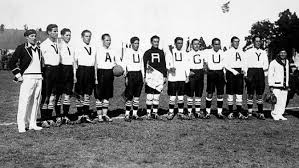By Samindra Kunti
July 31 – Argentina and Uruguay will press forward with their joint-bid to host the 2030 World Cup. They will face stiff competition from Europe and China even though the latter cannot technically jump the gun under FIFA rules.
Last week Argentina sports secretary Carlos Mac Allister said that the presidents of both countries and both FAs had agreed to push on with the idea of a joint-bid.
There is historical logic to the bid. South America has a long and intricate love story with the World Cup and the continent hosted the inaugural edition of the tournament in 1930. It was a tale of long boat trips and exhausted European participants.
Hosts Uruguay had won the amateur Olympic football tournaments at both the 1924 Paris Olympic Games and the 1928 Amsterdam Olympic Games and affirmed their status as first kings of the global game with 4-2 victory in the final against neighbours Argentina at the legendary Estadio Centenario in Montevideo.
Today little has changed at the Parque Jose Batlle, but the leadership of Uruguay and Argentina may face questions about spending billions on football stadiums and other related infrastructure that may well be better spent elsewhere.
Brazil hosted the last World Cup and the Rio 2016 Olympic Games, but poor planning and inflated budgets have caused ‘white elephants’ and deficits in government spending. For FIFA though, the Brazil World Cup was the most profitable edition to date.
The concept of a joint-bid is shaky. It is not simply about providing the stadia, the airports, the hotels, the transport infrastructure, broadcast facilities and other demands that go with the hosting the World Cup, but the South American joint-bid seems to lack political clout, or at least there is lack of appetite in political circles for the idea.
The United States, Canada and Mexico appear to have a virtual guarantee to host the 2026 World Cup, with the FIFA Council reintroducing the rotation rule, ruling out bids from Europe and Asia. Former FIFA secretary-general Jerome Valcke also tied up a TV deal with Fox to appease the US over their defeat by Qatar in the 2022 hosting race.
Speculation is intensifying that China may try to land 2030 even though Qatar, from the same confederation (Asia), is hosting 2022. FIFA’s executive are certainly understood to be sympathetic to a Chinese bid, particularly in light of the country’s sponsorship support of FIFA. However, a more likely scenario is that China waits until 2034.
It is a point UEFA president Aleksander Ceferin emphasised on the eve of the Champions League final in Cardiff. France, Germany, Italy and England could all host the 48-team tournament. The prospect of a formidable Chinese bid (if ultimately allowed) and UEFA throwing its weight behind a European candidate would potentially leave the joint-bid from Uruguay and Argentina in a three-way fight.
Contact the writer of this story at moc.l1745272722labto1745272722ofdlr1745272722owedi1745272722sni@i1745272722tnuk.1745272722ardni1745272722mas1745272722

